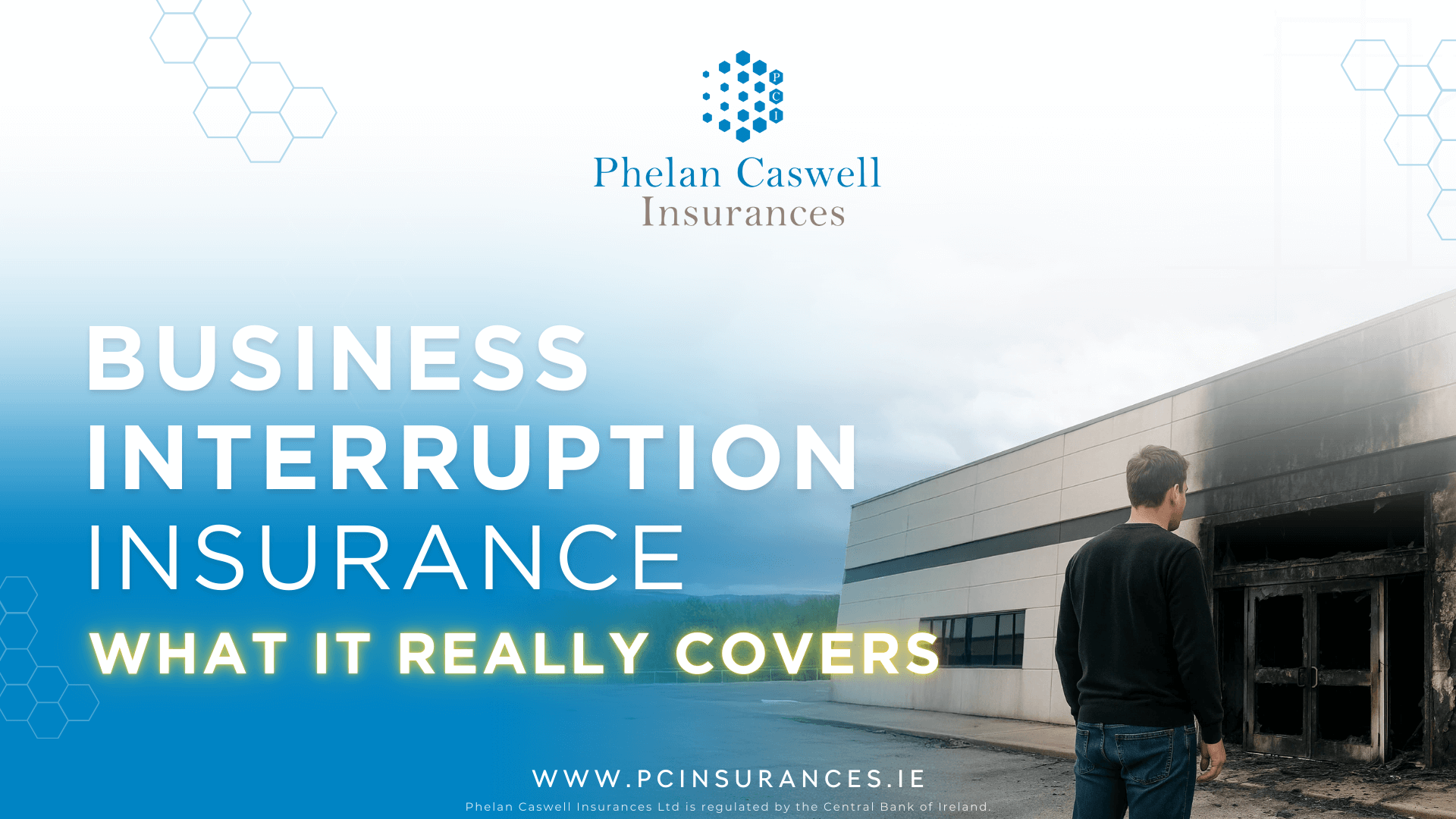
Business Interruption Insurance in Ireland: What It Really Covers in 2025
Running a business in Ireland today is more complex than ever. Companies face challenges that extend beyond day-to-day risks. Supply chain delays, cyber-attacks, and extreme weather now threaten continuity as much as fire or flood. Because of this, Business Interruption Insurance (BII) has become one of the most important covers for Irish businesses in 2025.
At Phelan Caswell Insurance, we are proud to be recognised as one of Ireland’s leading experts in this field. In this article, we will explain what Business Interruption Insurance really covers in 2025, why it matters, and how Irish businesses can make the most of it.
What Is Business Interruption Insurance?
Business Interruption Insurance, often called BII, provides financial protection when your business cannot trade normally after an insured event. It does not cover the physical damage itself. Instead, it covers the loss of income and additional expenses caused by the disruption.
For example, if a fire damages your warehouse, property insurance covers the repairs. However, BII steps in to cover the profits you lose while operations are halted, along with any temporary costs required to keep trading.
Why Is It More Relevant in 2025?
The last few years have changed how Irish businesses view risk. Rising energy costs, climate events, and global supply chain issues have made business continuity harder to secure.
Additionally, cyber-attacks have grown sharply in Ireland, (“click here to read our cyber insurance blog for an in-depth look at this), affecting both SMEs and large organisations. While property damage was once the main concern, intangible risks now cause some of the largest losses.
In 2025, insurers have adapted. BII policies now address not only traditional risks like fire or storm but also cover wider modern triggers, depending on the wording of your policy.
Core Cover: Income Protection
The first and most vital part of Business Interruption Insurance is the replacement of lost income. This ensures your business can continue to pay overheads such as:
- Staff salaries
- Rent or mortgage repayments
- Loan commitments
- Supplier contracts
Without this support, many businesses would not survive the recovery period. Even a short closure can drain cash reserves, especially for SMEs.
Increased Costs of Working
Another essential feature is cover for Increased Costs of Working. This refers to the extra expenses you incur to keep trading after an incident.
For example, you may need to:
- Rent temporary premises
- Hire replacement equipment
- Pay for overtime staff
- Use premium freight to restore supply chains
These costs can be claimed under BII, provided they reduce or prevent loss of income.
Material Damage Proviso
Most Business Interruption Insurance in Ireland is tied to the Material Damage Proviso. This means the policy usually activates only if there is insured physical damage to property first.
For instance, a fire, flood, or storm must trigger the property policy, and then BII follows. However, modern endorsements and optional extensions are changing this. Consult your insurance provider or talk to our team to find out more about this.
Extensions Common in 2025
Irish businesses now rely heavily on policy extensions. These broaden cover to match current risks. Some of the most relevant in 2025 include:
- Denial of Access: If authorities restrict access to your premises after an incident nearby.
- Supply Chain/Customers’ Premises: If a key supplier or customer suffers damage, causing knock-on losses.
- Utility Interruption: Cover for losses from power, water, or telecom failures.
- Cyber Business Interruption: Growing in importance, this covers downtime after a cyber-attack or data breach.
These extensions often make the difference between limited protection and a lifeline during crisis.
Indemnity Period – Why Duration Matters
A critical feature of BII is the indemnity period. This is the maximum time your insurer will pay for losses.
Standard Irish policies offer 12 months. However, recovery often takes much longer. Planning permission delays, specialist equipment lead times, and construction shortages mean some businesses need 18, 24, or even 36 months.
Choosing too short a period can leave you exposed just when you need support most. At Phelan Caswell Insurance, we always advise careful evaluation of your realistic recovery time. Talk with one of our qualified insurance experts today. Click Here
Gross Profit vs Gross Revenue
BII often bases compensation on Gross Profit, which is not the same as revenue. In insurance terms, Gross Profit usually means turnover less variable costs such as materials.
This distinction is important. Many Irish businesses misunderstand the calculation. During claims, this can cause confusion or underpayment if sums insured are not calculated properly. Working with a broker ensures your declared figures match the insurer’s definition.
Common Misconceptions in Ireland
Many businesses still misunderstand Business Interruption cover. Some common misconceptions we encounter include:
- Believing it only applies after a fire
- Assuming standard policies cover pandemics (they usually do not post-COVID)
- Thinking income is replaced automatically without accurate financial records
- Believing one year is always enough indemnity period
Clarifying these points in advance helps avoid disappointment during a claim.
Case Study Example
Consider an Irish food processing company whose plant suffers flood damage in 2024. The property insurance covers repairs, but the plant cannot operate for 14 months.
During that time, the business would normally earn €15 million. Thanks to BII, the company receives compensation for lost profit, continues paying staff, and even funds temporary outsourcing to maintain customer contracts.
Without BII, this company could have lost market share permanently and risked insolvency.
The Role of Expert Advice
Business Interruption Insurance is complex. Policy wordings vary, and extensions often make the difference. No two policies are the same. Calculating sums insured also requires deep knowledge of your financials and sector.
At Phelan Caswell Insurance, our team specialises in this area. We guide Irish businesses through every step, from risk assessment to claims support. By tailoring cover, we ensure resilience even in today’s volatile environment.
Trends to Watch in last quater of 2025 and into 2026
As Ireland moves further into 2025, we expect several trends to continue shaping BII:
- Climate impact: More frequent flooding and storms driving claims.
- Cyber exposure: Expanded cover and higher demand for digital protection.
- Regulatory shifts: EU insurance directives shaping Irish policies.
- Longer rebuild times: Acquiring construction workers and trades people in Ireland is currently very difficult. According to CIF reports Ireland is currently experiencing a shortage in trades people. Making extended indemnity periods increasingly important.
Businesses that act early and review cover regularly will be best placed to weather these challenges.
What next?
Business Interruption Insurance is no longer optional for many Irish companies. In 2025, it is a vital safety net that supports recovery after unexpected disruption.
By covering lost income, extra costs, and broader risks through extensions, it protects not just property but the very future of a business. However, the policy must be arranged correctly, with the right indemnity period and accurate sums insured.
At Phelan Caswell Insurance, we understand the stakes. As one of Ireland’s leading experts in Business Interruption cover, we are here to ensure your business has the resilience it needs in 2025 and beyond.
Contact us today to discuss a tailored for your organisation in Ireland.
Phelan Caswell Insurances. Protect your business, your reputation, and your future.
Disclaimer
This article is for general information only and does not constitute insurance or financial advice. Cover varies by provider, wording, and individual circumstances. Businesses should consult a qualified insurance broker or advisor before making decisions about Business Interruption Insurance




